Name one lab safety procedure to follow when heating a test tube. 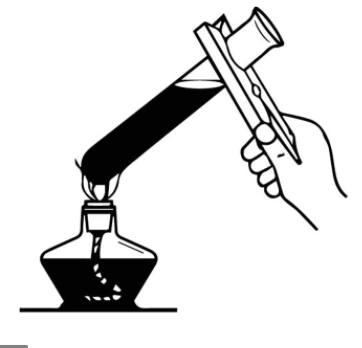
Wear goggles, have the tube pointed away from your face, wear gloves, tie hair back, do not cork the test tube.
What is the smallest functional unit of life, the building blocks of all living things?
The cell
True or false: Plants are not considered living things.
FALSE
True or False: Viruses are not considered living things.
True
What is an example of the smallest functional unit for the circulatory system?
a. blood
b. a muscle cell
c. heart
d. vessels
B. a muscle cell
Who was the scientist who came up with the idea of Natural Selection?
Charles Darwin
Air, soil, sun
Removal of wastes illustrates what life function
Excretion
What is the difference between a prokaryote and a eukaryote?
Prokaryotes (No) do not have a nucleus
Eukaryotes do have a nucleus
Prokaryotes = Bacteria
Eukaryotes= Protists, plants, animals, fungi
What part of the plant does the majority of photosynthesis happen in?
Leaves
A jelly fish is known to clone itself. It does this by growing buds on its tentacles. What type of reproduction is this.
asexual
Which body system is used to give your body support and structure and protects organs of the body? Also provides anchoring points for muscles.
skeletal
What is it called when an organism changes to survive better in a changing environment?
adaptation
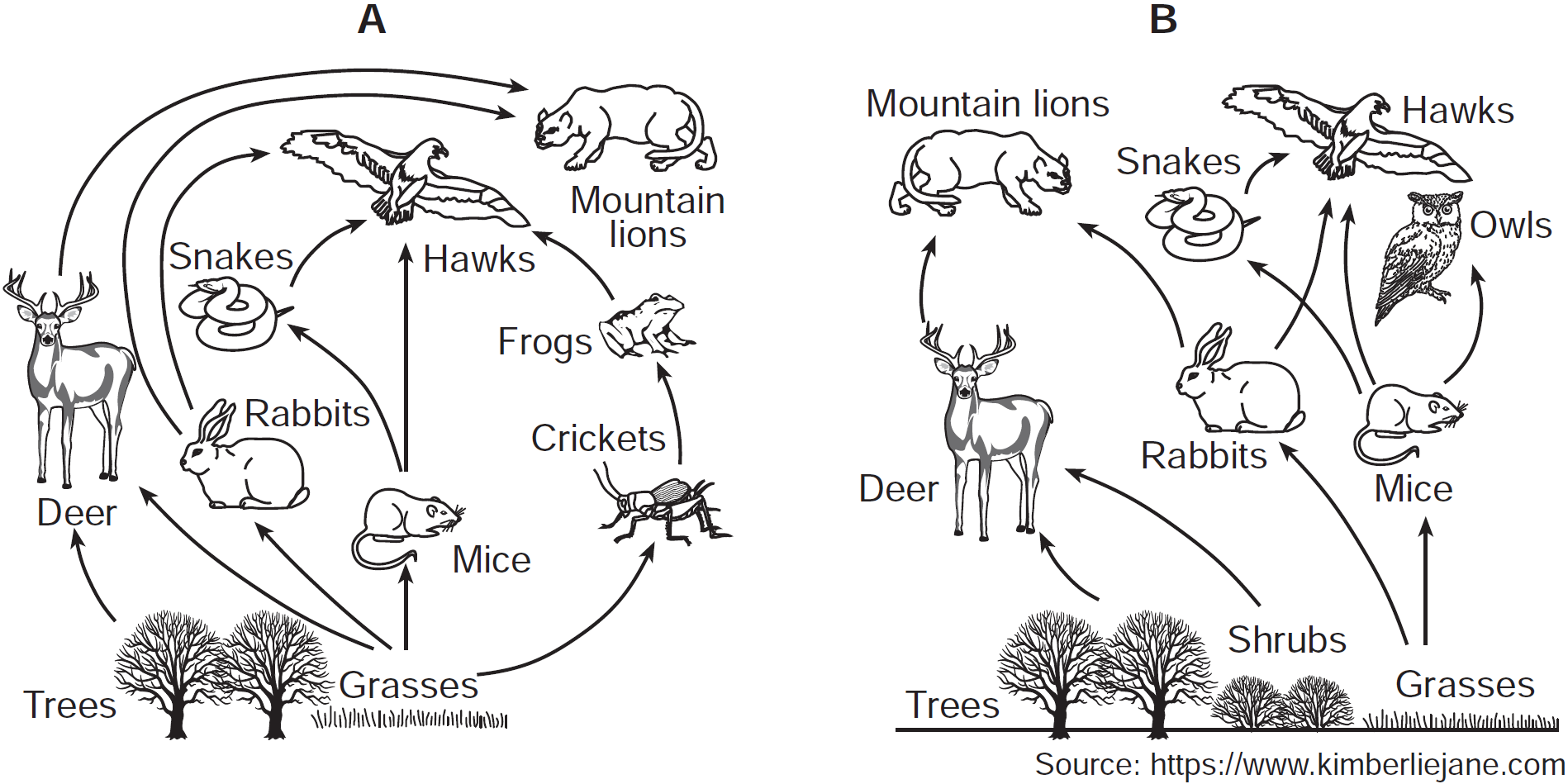
Which statement best describes what would most likely happen if some of the owls from location B moved to location A?
Hawk population will decrease due to competition
What you are altering the genetics of an organism, or inserting altered DNA into an organism. This is an example of what?
Genetic engineering
Where does protein synthesis occur?
Ribosome
Name one organelle plant cells have, but animal cells do not.
Cell wall & chloroplast
What is the ONE life function that is not necessary for individual organism to stay alive?
Reproduction
The kidney collects wastes from the blood and rids it from the body. Which two systems work together to perform this function?
Circulatory and Excretory
What is it called when there is an error in an organism's DNA?
mutation
When moving up an energy pyramid, where does the energy go that does not go up to the next level
It is lost as heat
An experiment is carried out to determine how different pH values of soil will affect the growth of tomato plants. In this experiment, the dependent variable could be the.
Plant height
Which organelle contains DNA?
Nucleus
What are the raw materials of photosynthesis?
What are the products of photosynthesis?
Raw materials: Carbon dioxide and water
Products: Oxygen and glucose
What is a benefit of sexual reproduction?
More genetic diversity
What two body systems get you the raw materials you need for cellular respiration?
Digestive = Glucose
Respiratory = Oxygen
DNA is formed using four kinds of base subunits. In a double-stranded segment of DNA, the percentage of the base C is 18%. What is the approximate percentage of base T?
32%
What will increase the stability of an ecosystem?
Increase in biodiversity
Increase in different species
Increase in genetic diversity among organisms
To compare the growth of plants grown under specific colors of light with that of plants grown under natural conditions, four groups of bean plants were grown under the light conditions indicated below. All other factors were kept constant.
Group A – red light
Group B – green light
Group C – violet light
Group D – white light
In this investigation, which group of plants served as the control?
Group D - White light
A small lizard spends the morning hours lying in the sunlight until it's body temperature rises. Later on in the day the lizard rests in the shady area until its body temperature cools. This type of behavior is important to.
maintain homeostasis.
What structures bring nutrients and water as well was sugar to different parts of the plant?
Xylem and Phloem
Base your answer on the graph below and on your knowledge of biology. The graph shows the changes in a population over a period of 10 years.
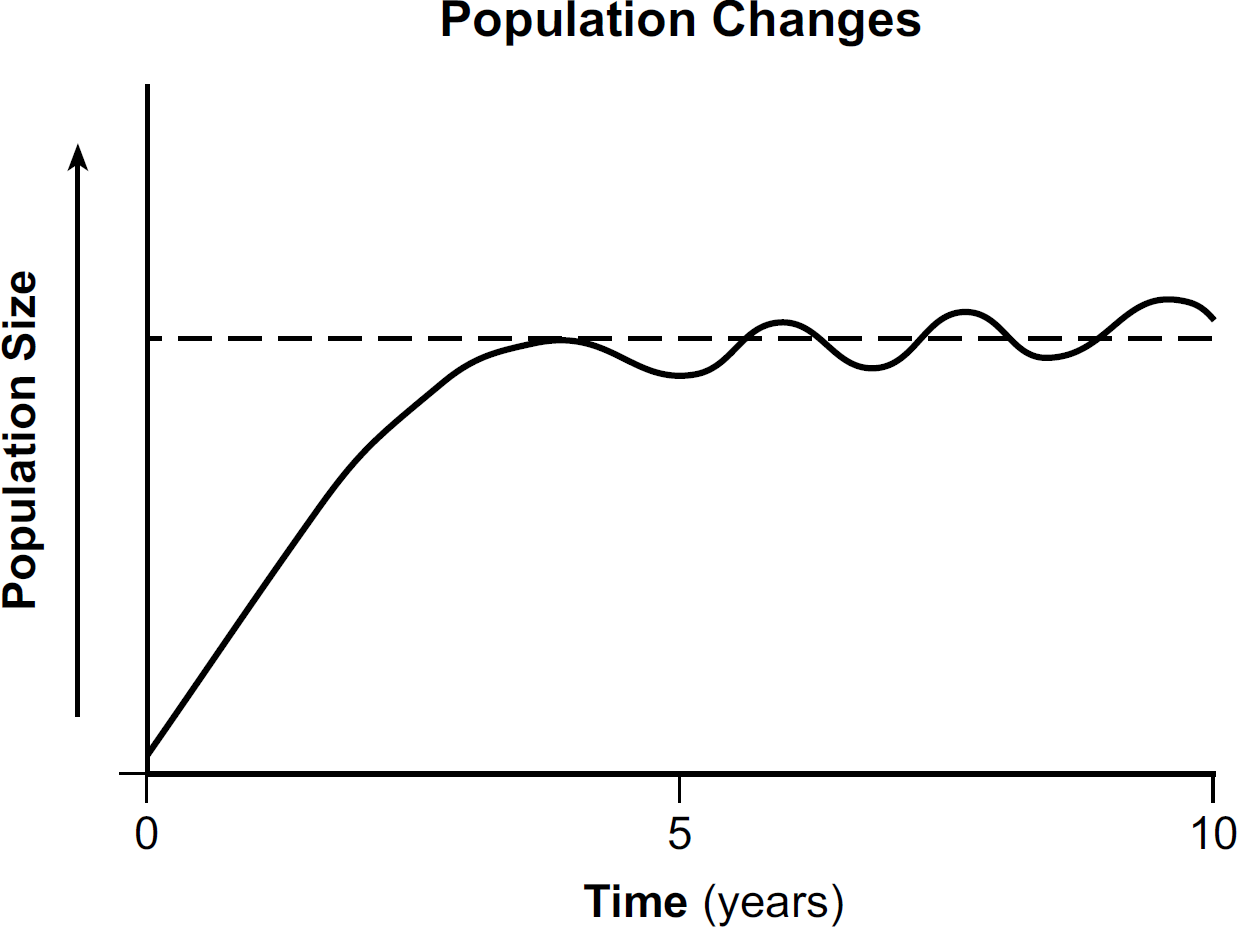
Explain one likely reason for the population-size changes, as indicated by the graph, between years 5 and 10.
— The population had reached the ecosystem's carrying capacity, and there were small changes due to predation/competition/disease.
Tell me how the circulatory system and the respiratory system work together to maintain homeostasis in the body.
The respiratory system takes in oxygen, the circulatory system circulates it through out your body.
According to the table below, which amino acid sequence would most likely be determined by a section of a DNA molecule with the base sequence A-A-G-G-A-T-C-C-G?
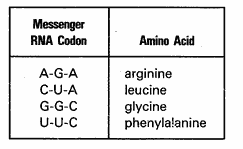
phenylalanine–leucine–glycine
Solar power
Wind power
Geothermal
Harnessing energy from waves.
What is a direct benefit of utilizing these technologies?
Decreased use of nonrenewable resources
(burning fossil fuels)
The diagram below illustrates asexual reproduction in bread mold. Reproductive structures known as spores were released from bread mold A. One of these spores developed into bread mold B.
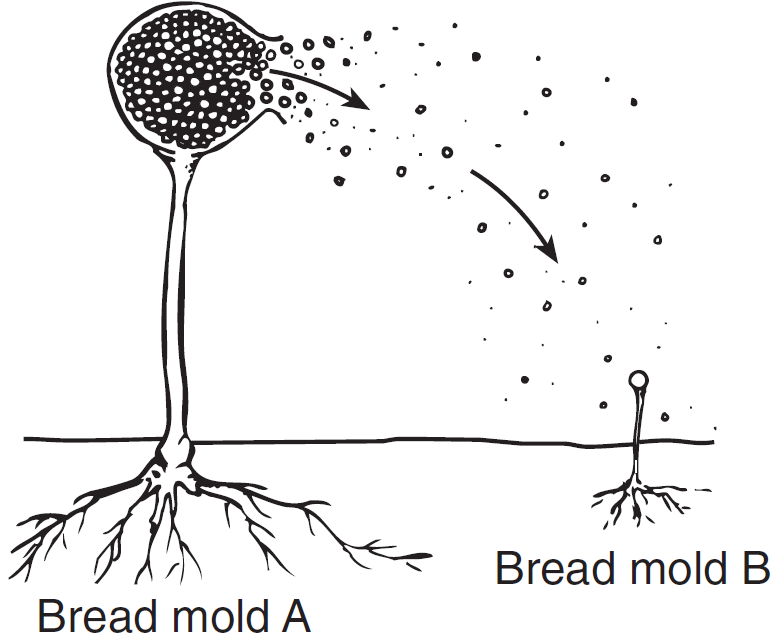
State how the genetic information in the nuclei of cells in bread mold B compares to the genetic information in the nuclei of cells in bread mold A.
The nuclei of cells in mold B are genetically identical to the nuclei of cells in mold A.
What organelle does photosynthesis happen in, and what organelle does cellular respiration happen in?
Photosynthesis = chloroplast
Cellular respiration= mitochondria
Bye – Bye Bananas?
The world's most popular type of banana is facing a major health crisis. According to a new study, a disease caused by a powerful fungus is killing the Cavendish banana, which accounts for 99% of the banana market around the globe. The disease, called tropical race 4 (TR4), has affected banana crops in southeast Asia for decades. In recent years, it has spread to the Middle East and the African nation of Mozambique. Now experts fear the disease will show up in Latin America, where the majority of the world's bananas are grown. ...
...Once a banana plant is infected with TR4, it cannot get nourishment from water and nutrients, and basically dies of thirst. TR4 lives in soil, and can easily end up on a person's boots. If the contaminated boots are then worn on a field where Cavendish bananas are grown, the disease could be transferred. "Once a field has been contaminated with the disease, you can't grow Cavendish bananas there anymore," Randy Ploetz [scientist] says. "The disease lasts a long time in the soil."...
...But Cavendish [banana] is also particularly vulnerable to TR4. The banana is grown in what is called monoculture. "You see a big field of bananas and each one is genetically identical to its neighbor" Ploetz says. "And they are all uniformly susceptible to this disease. So once one plant gets infected, it just runs like wildfire throughout that entire plantation."...
State how the TR4 fungus threatens homeostasis within the banana plant.
— The TR4 fungus interferes with the transport of water and other materials within the banana plant.
— The fungus that attacks the banana plant interferes with the plant's normal functions and the plant basically dies of thirst.
— The fungus prevents water from reaching the leaves, preventing photosynthesis.
— The plant cannot get nourishment from water and nutrients.
Base your answer on the diagram below and on your knowledge of biology. The diagram represents a human enzyme.
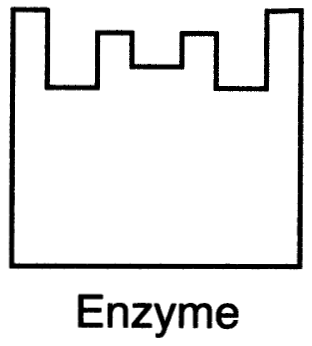
Draw a molecule that would most likely be able to interact with this enzyme.
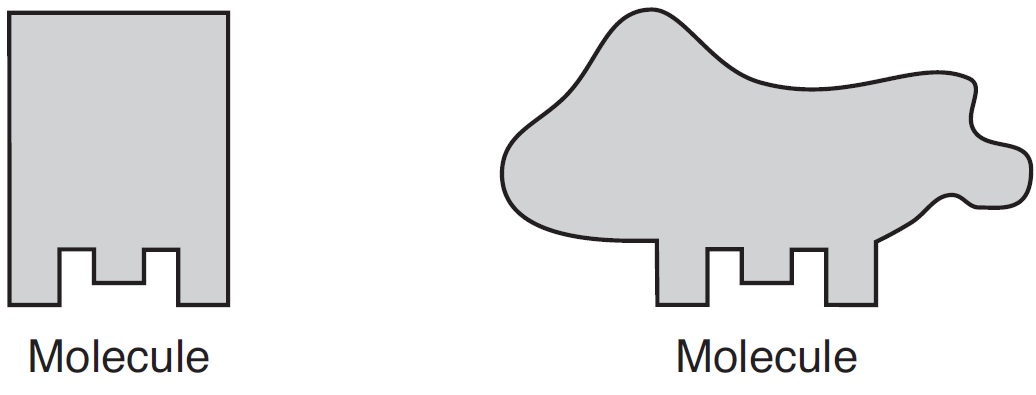
White Blood cells have main roles in what two systems?
Circulatory and Immune
What is the difference between mitosis and meiosis?
Mitosis creates identical cells - used when making body cells. Growth, healing tissue.
Meiosis makes non identical sex cells. Sperm and Egg cells.
After a wild fire, what is most likely to occur in the future?
What is this ecological concept called.
The ecosystem will eventually restore itself and will be similar to the original.
Ecological succession.
In a cell, a variety of structures perform specific functions and interact to maintain homeostasis. The diagram below represents a typical cell with three cell structures labeled 1, 2, and 3.
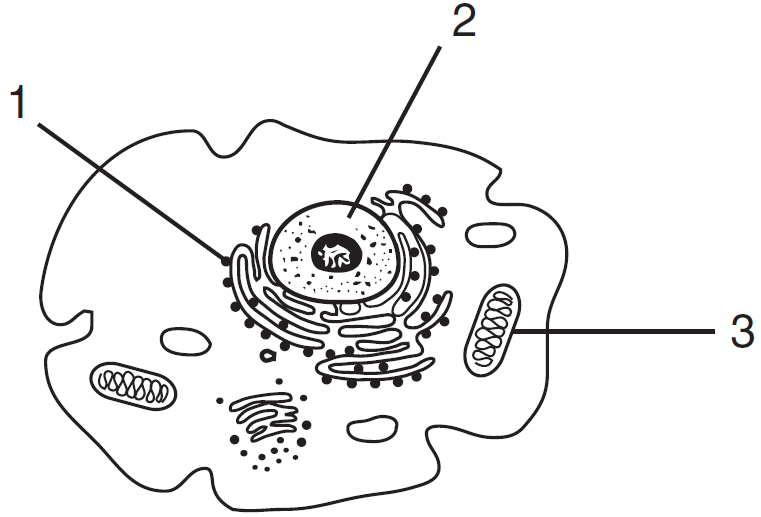
Select one cell structure labeled in the diagram and write its number in the space below. Explain how the cell structure you selected helps maintain homeostasis in a cell.
In your answer, be sure to:
- identify the cell structure you selected
- state one function of this cell structure
- identify one substance that is often associated with the cell structure you selected and state how that substance is associated with the cell structure
- identify one other cell structure and explain how it interacts with the cell structure you selected to maintain homeostasis in the cell
Structure 1
• ribosome • site of protein synthesis • amino acid — used to make proteins • nucleus — the ribosome gets instructions from the nucleus determining which proteins are produced by the cell
Structure 2
• nucleus • control of cell processes • DNA — makes up the chromosomes in the nucleus
• ribosome — nucleus sends instructions to ribosomes for protein synthesis
Structure 3
• mitochondrion • site of energy release/cell respiration • ATP — produced in the mitochondrion
• cell membrane — allows glucose to enter cell and be used by the mitochondrion for energy release
On a hot day dogs sweat through their paw pads and pant, which helps keep them cool. Both sweating and panting are.
Response to stimulus
Corals are a group of organisms that live in shallow, warm areas of the world's oceans. Coral reefs are composed of a hard material that is produced by these small coral animals, and is then colonized by photosynthetic organisms called Zooxanthellae. These plant-like organisms generate sugars that are used by their animal partners for food and are needed for the survival of the coral.
State one possible reason that coral reefs exist only in shallow waters.
— Sunlight is available for photosynthesis in shallow waters.
— Light may not be available in deep waters.
— Their food providers live in shallow water.
— More food is available there.
— Zooxanthellae are photosynthetic.
Artificial Placenta
It is estimated that every year more than 15 million babies are born too early. The lungs of these premature infants are often immature and easily damaged. Premature births happen for a variety of reasons-some known and some unknown. Those that are known include infections and conditions such as diabetes and high blood pressure. Scientists are researching what causes premature births, in an attempt to develop solutions to prevent them.
Scientists are also working on the development of an artificial placenta. At the University of Michigan, five premature lambs were placed in artificial placentas and kept alive for weeks. During this time, each lamb's blood was circulated through its artificial placenta.
Discuss how the development of an artificial placenta is an important step in the study of premature births.
State one reason why premature lambs were likely used as model organisms in this study rather than mice
— Lambs are larger and more similar to human fetuses than mice are. — The development of a premature lamb is more similar to that of a human.
9)
Base your answer on the passage below and on your knowledge of biology.
Polio is a virus that can cause paralysis or death. At its peak, the disease affected about 500,000 people a year worldwide before the development of an effective vaccine in 1955.
When the first polio vaccine was developed, it was tested in experiments using thousands of children as subjects. The children were injected with either the experimental vaccine or given a harmless injection without the vaccine. Only after these extensive tests was the vaccine finally accepted as being successful in preventing the disease.
Although, at this time, polio has been nearly eliminated in the Western Hemisphere, certain countries in the world still report new cases of the disease. Complete elimination of the disease can be achieved in these countries by vaccinating all of the children at the same time with the polio vaccine.
Identify the substance in the polio vaccine that makes it effective.
— dead/weakened pathogen — antigens — a small piece of the virus/viral coat
The male peacock, illustrated below, attracts females (peahens) by fanning out his very long tail feathers in an elaborate display. However, the large fan of colorful feathers makes the males more noticeable to predators and makes it difficult for them to escape.
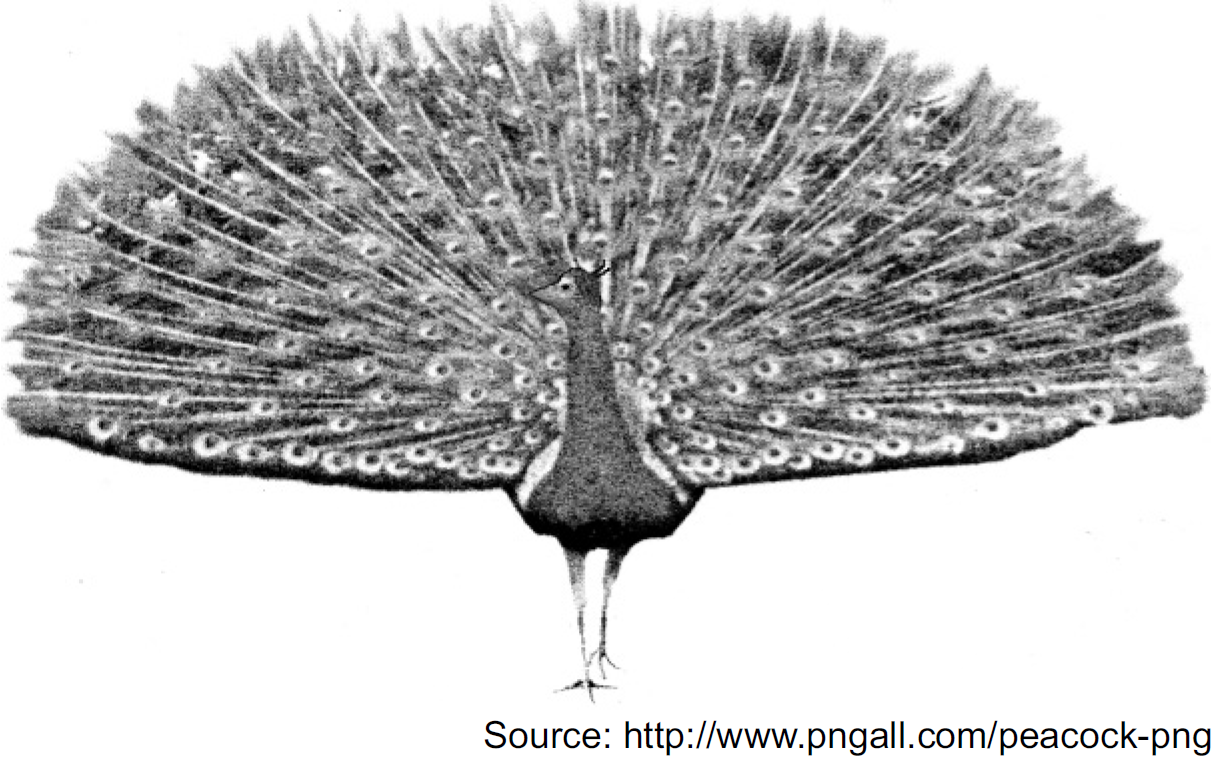
Explain why male peacocks continue to have large tail feathers, even though having the feathers may make them more likely to be killed by predators.
— Peacocks with the largest tail-feather displays attract more females, mate, and produce more offspring.
Atmospheric Carbon Dioxide
Records from polar ice cores show that the natural range of atmospheric carbon dioxide over the past 800,000 years was 170 to 300 parts per million (ppm) by volume. In the early 20th century, scientists began to suspect that in the atmosphere might be increasing beyond this range due to human activities, but there were no clear measurements of this trend. In 1958, Charles David Keeling began measuring atmospheric at the Mauna Loa observatory on the big island of Hawaii.
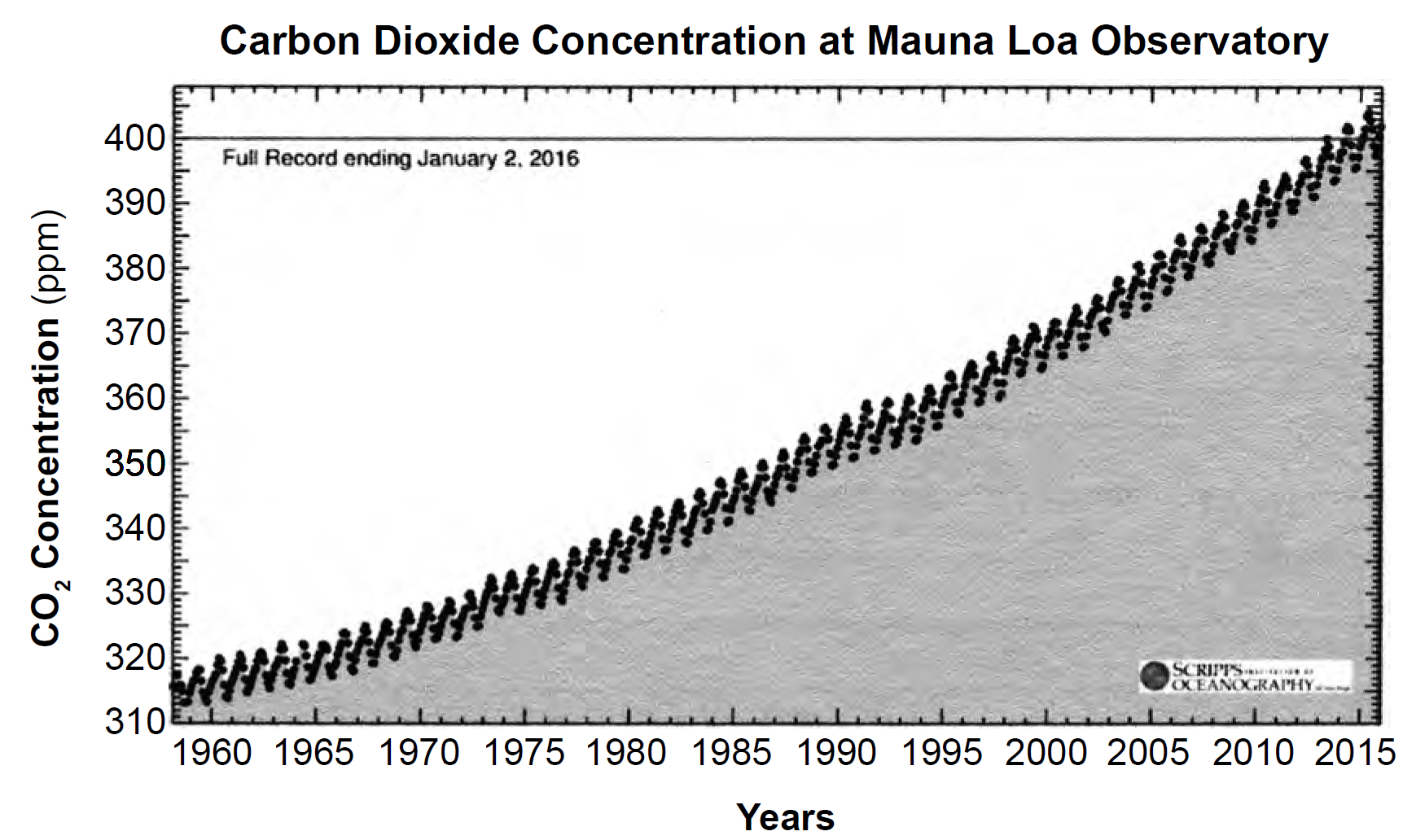
Identify one likely reason for the overall change in concentration observed between 1958 and 2015.
— The concentration of increased between 1958 and 2015 due to more produced
by burning fossil fuels.
— There was an increase in due to more people driving more cars.
— There has been an increase in the use of fossil fuels.
— increased industrialization
— in the atmosphere increased due to human activities.
— deforestation